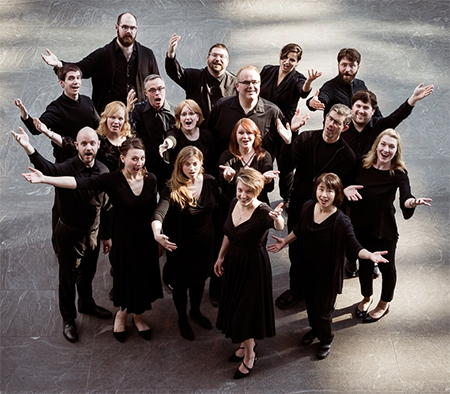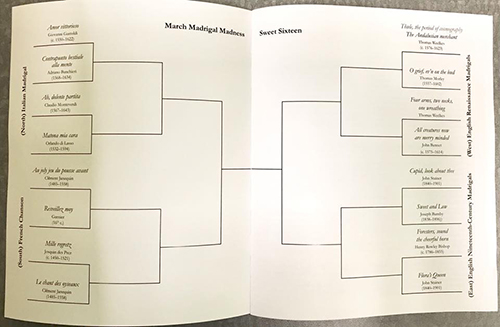by Daniel Hathaway

If the metaphor began to unravel a bit as the afternoon progressed, the event was great fun and packed with an interesting selection of pieces from 16th-century Italy, France, and England, as well as Victorian England — when the madrigal experienced its second renaissance.
In the Italian part of the draw, Monteverdi’s Ah, dolente partita beat out Gastoldi’s rousing Amor vittorioso, Banchieri’s hilarious Contrapunto bestiale alla mente, and di Lasso’s raunchy Matona, mia cara.
Moving on to France, Janequin’s virtuosic Le chant des oyseaux edged out not only the same composer’s Au joly jeu du pousse avant but also Garnier’s Resveillez moy and Josquin’s famous Mille regretz to go on to compete with the two categories of Brits in the ensuing round.
In the English Renaissance region, the audience passed over Weelkes’ ultra-sophisticated Thule, the period of cosmography / The Andalusian merchant, as well as his coyly suggestive Four arms, two necks, one wreathing and Morley’s O grief, ev’n on the bud to declare a winner in John Bennett’s All creatures now are merry minded, a paean to Elizabeth I from The Triumphs of Oriana.

In the championship round, Barnby handily beat out Monteverdi, a result which may have inspired some head scratching, but go figure. MacPherson and his singers seemed to be thoroughly enjoying themselves while turning in some distinguished performances of tricky, unaccompanied, and largely unconducted pieces.
Perhaps their evident camaraderie will inspire other singers to turn their heads away from Netflix and the hundreds of other manufactured entertainments that beckon us from screens large and small, and hold madrigal parties where people create their own amusement by singing this engaging repertoire in small groups. Now wouldn’t that be fun? (Fa-la-la!)
Published on ClevelandClassical.com March 21, 2018.
Click here for a printable copy of this article



